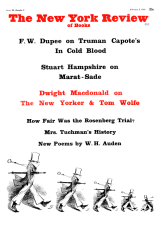Noah Greenberg was that rarest of human beings, an artiste without self-regard. However he may crave immediate success, a composer or a playwright knows that, if his work is any good, it is irreplaceable and will continue to be played after he is dead. A conductor or a singer or an actor, on the other hand, knows that, however good he may be, he is necessarily replaceable simply because he is mortal; if he does not succeed in his lifetime, he has failed. The temptation for an artiste, therefore, to draw attention to himself by mannerisms and “personal interpretations,” to conform to popular taste rather than risk a flop, is so great that only the strongest character can resist it. Noah Greenberg did.
Moreover, in no field are the pressures so great as in the field of music. However psychologists may explain it, the musical taste of the average man is more conservative than his taste in any of the other arts. Whereas most people like to see a play they have never seen before, few feel well-disposed towards a piece, still fewer towards a style, of music they have never heard before. Hence the extraordinary narrowness of the standard concert repertory. To devote one’s musical career, as Noah Greenberg did, to works outside this repertory, calls for faith and courage of the highest order.
When he first formed the Pro Musica Antiqua, I must confess I was skeptical. How on earth, I wondered, is he going to persuade anybody except a few cranks to listen to Medieval and Baroque music? Am I even going to enjoy it myself? As we all know, he did succeed, and premature as his death was, he died knowing that his company had become an indispensable element in the musical life not only in the States but also in Europe.
His total absorption in the music he loved, without a thought of his own fame or reward, showed itself also in his relations to those he worked with. In my own dealings with him, for example, I found that, when it came to a matter of contracts, I had to be careful he didn’t cheat himself.
Professionally, it was a singular privilege for me to have been permitted to collaborate with him on several occasions; personally, I shall cherish his memory as long as I live.
—W. H. Auden
This Issue
February 3, 1966



